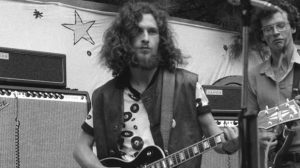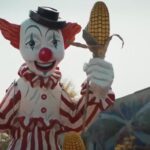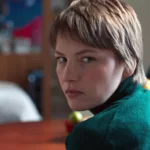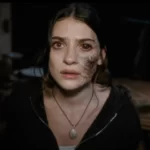Ross Wilson has earned his stripes as one of Australia’s great songwriters. Wilson built his reputation early with Daddy Cool and a slew of hits including Eagle Rock, Come Back Again and Hi Honey Ho. More experimental work came with Sons Of Vegetal Mother and The Mighty Kong. He produced the first two Skyhooks records, then had another run at the charts as frontman/songwriter with Mondo Rock. Wilson records solo records and tours regularly. Here he chats with Sean Sennett about songwriting and his working relationships with the likes of the late Ross Hannaford and Eric McCusker
Some of your signature songs are so embedded in the cultural DNA. One obviously stands above everything … how quickly or easily did “Eagle Rock” come to you?
Not quick but only because I was interrupted. I was actually in England when I started writing it. I’d left Australia. Got an invitation from a band to go and join them over there, an Australian/New Zealand band. And so I hung with them and had a great time. Nothing eventuated. We recorded a couple of tracks but nothing really happened. But at the time I was kind of getting back into my childhood the music I liked as a kid, which was old rock, which was rock and roll. When I was a kid, it was new. I had all these singles and stuff, but I loved blues as well.
I started to play guitar a bit better and came up with the riff. The riff is based around the A chord, and because I’m not very good at guitar, and was particularly not good back then, not moving the hand too much. I just moved my fingers a little bit. You hold the A chord and move your little finger occasionally, getting the different note.
I came up with that and thought it was pretty good. And I also had seen a photograph of some black people dancing, and it said they were doing the Eagle Rock, and I thought well, this has an archaic flavour about it, the thing I was playing. And it was half ragtime, half boogie kind of thing. I thought yeah, that’s good. I can imagine the people dancing. This photo of them all dancing in this juke joint somewhere. It was like the flavour I needed.
I started calling it “Eagle Rock,” and shouting out a few things. Then I’d left England. The band broke up and I did an odyssey with my new wife Pat across Europe, the Middle East into Asia India and Asia. By the time we got back, finally got back to Melbourne after months and months, and totally broke, we went back into my bedroom at my folks’ place where I grew up.
Finally, I had a guitar again, and I was playing the song. I thought this is good, I remembered it. All the way through the journey I’d been thinking of it, and a few other songs I wrote in my head on the way. Finally now I had a guitar I could do something, and I thought this needs something else. What’ll I do? I only knew a few more chords, so it’s in A, I knew the G chord, and I knew a D chord and an E chord and I went “Hey, hey, hey, good old Eagle Rock…” down to the G, which is what makes the whole song, really.
It goes to this chord you don’t expect, and then it goes to another chord you don’t expect, which is a B minor, which a lot of people think is D. It goes G, B minor, D, A, E and an A again. That sort of gave it some form other than just being a boogie. I slammed it all together and thought geez, this is pretty good.
I was getting in contact with all my old mates. Hanna (Ross Hannaford) was at art school by that stage and he had this little country rock band with some other guys I knew. I took it around to him and went, “Hey fellas, what about this song I’ve written?” And he goes, “Yeah, that’s pretty good.” So I spent an afternoon showing it to him, and when I left the other guys said, “Nah, we don’t want to do that.”
So then I finally got someguys together and we started playing it. Then whenDaddy Cool sort of coagulated out of that bigger band, underground sort of band, it was just the right amount of people and the right people to make it sound good. I swear, it would not have sounded half as good done by other people.People still can’t play it properly. It’s got a kind of voodoo about it that’s hard to define, particularly on the record. You just kind of go, “How are they doing it?” Even I listen to it and I go “How did we make those noises?”
Keith Richards says he and Ronnie Wood call their guitar interplay an ancient form of weaving. Did you and Ross Hannaford have a similar kind of thing?
It was a bit like that because we’d both grown up in our teens in our first bands together. He’d been in a couple little bands and banjo jug bands and things. Then when I met him he was turning 13. We formed the band the Pink Finks and we basically learned how to do things together.
He and I had this similar kind of rhythmic approach. So we always would complement each other. It becomes kind of instinctual like Ronnie Wood and Keith Richards. You don’t have to talk about it much. You just do it and come up with things because you’ve got this other guy supporting you and vice versa, struggling to get a groove. That’s very conducive to being creative, because when you’ve got all that groove support you don’t have to think too much. You just kind of throw things out.
When you moved onto Mondo Rock, I know you’d done other things apart from Mondos and Daddy Cool, you’d written a lot of hits. (Wilson wrote ‘A Touch Of Paradise’, ‘Cool World’ and more). Then you were in a situation where somebody else is writing some hits as well, with Eric McCusker (‘Come Said The Boy’, ‘State Of The Heart’, ‘Summer Of 81’ and ‘Chemistry’ among them). How was it for you then to be interpreting another’s work?
On one hand it’s great because Eric approaches melodies differently than I do. He’s more knowledgeable musically. He actually learned how to do things properly. He’d go “Here’s how the melody goes,” and I’d have to kind of go “Oh, can I just sort of bend it a bit here, try to put my spin on it?” Sometimes it worked. Sometimes it didn’t. Other times it would be like “Well, Eric, it’s a good song but I don’t think it’s right for me,” after we’d give it a bit of a go.
There was a high attrition rate of my songs and his songs. But I got him into the band because he did write songs. We needed a lead guitarist, but the fact he was a lead guitarist that writes songs, that’s why he got the gig over other guys. I write songs but I don’t just pour them out. I tend to really work on a song and so if you have to do an album a year, it’s hard to get however many songs that are all really good.
Having him there, and he was like in a really good band, it gave him the boost he needed. When we had the line-up settled, the new line-up with James Black and Paul Christie and Eric and various drummers, but we ended up with J.J. (Hackett) he was churning out songs every week. We’d rehearse all the time if we weren’t playing. That’s a big thing too. If you don’t rehearse you don’t get the flow of trying out the new songs.
I remember we were playing and doing all these crazy songs, like musically different, and some of them we recorded and some we didn’t. Some were a bit too out there. But then there’s other ones, like there’s a song on the bonus album of the last compilation we put out, a demo of a song called “Photographica” which is just nuts. It’s so fast, and the lyrics are very odd.
Eric and I were kind of like complementing each other, and he would come up with songs, and then I would kind of inject rhythmic things. Sometimes he would be like playing the melody, the same as the song, playing as the vocal. He’d be playing the melody on the guitar and I’d say, “Don’t do that because then I can’t mess around too much. Can you play in between, play a rhythmic thing?” That’s how he came up with things like in “Chemistry”. It’s got a really great groove. Then it goes into the verse that was my idea. “She turned me ’round,” that’s got like a little springboard where the vocal can go.
You’re one of those writers that if somebody came to your house you’d have a classic song in the drawer that was unreleased. I’ve evidenced that. What is your process these days for writing? Is it something you like to do all the time, or just when you have a project coming up?
I do it when I feel there’s something happening. Having a project helps, so if I’m thinking it’s about time I did an album, I’ll start to think how am I going to do it, what songs have I got, and then maybe I haven’t got enough so I better write some more.
One of the most recent songs I wrote, I had this kind of guitar thing going. I was writing after a sound check, and this thing came into my head. By the time I got home from the sound check I sort of had all the lyrics, and I wrote them down.
That’s when you know you’ve got something good. Sometimes you’re writing lyrics because you’re trying to get some kind of central theme on the lyrics, and lyrics can sometimes be just wishy washy and you have to work on them. That’s the way I do it.
I might have a song in a drawer somewhere I’ve been sitting on, and I’ll bring it out and go ‘why haven’t I done this song yet?’ I’ll have a think about it and go well, I’ll start playing on the guitar, but I’ll go and play it on the piano. Then I sit on the piano, but I don’t play the piano, but I know the chords, and I come up with some new stuff because it’s got different voicing. Then suddenly I’m finishing it.
And another song, a song I’ve started playing live testing out on audiences is going really well. It was a song I’d always had a bit of trouble with because the chorus kind of went on and on. It was good, but so I just cut bars out. They had the same amount of words but too much music. I just jammed it all together and now it works really well.
How does it feel for you as a writer when somebody like a Joe Cocker (‘I Come In Peace’) records one of your songs? Is that the ultimate compliment for you as a songwriter?
That was pretty good. Then you sort of sit back waiting to hear what it sounds like. You never know. When people call up and say someone recorded your song, which doesn’t happen all that often, some of them get recorded frequently because they’re like old, classic sort of ones. But other ones, like you mentioned Joe Cocker and “I Come in Peace,” well that song’s only ever been on my solo album. I co-wrote it with Rick Brewster from The Angels. They put it on their album too. At that stage, Joe was the first person other than me to bring it out.
So you’re waiting because you never know whether it’s going to come out. It might get axed at the last minute. They might have 20 songs and only need 16 or something. But as it turned out, it did come out on his album. Then he started playing it as his opening song at concerts from that point on.
There’s a good YouTube of him doing it on a German awards show, which looks really high culture or something. They’ve all got black tie and everything in the audience, and he comes out and sings one of his classics, and then he does “This is my new song,” and they give him a lifetime achievement award. It was pretty cool.
Ross Wilson and the Peaceniks play Kedron Wavell this Friday night (September 23, 2016. His current Greatest Hits is available here http://daddycoolstore.bigcartel.com/product/mr-eagle-rock-the-best-of-ross-wilson-cd




